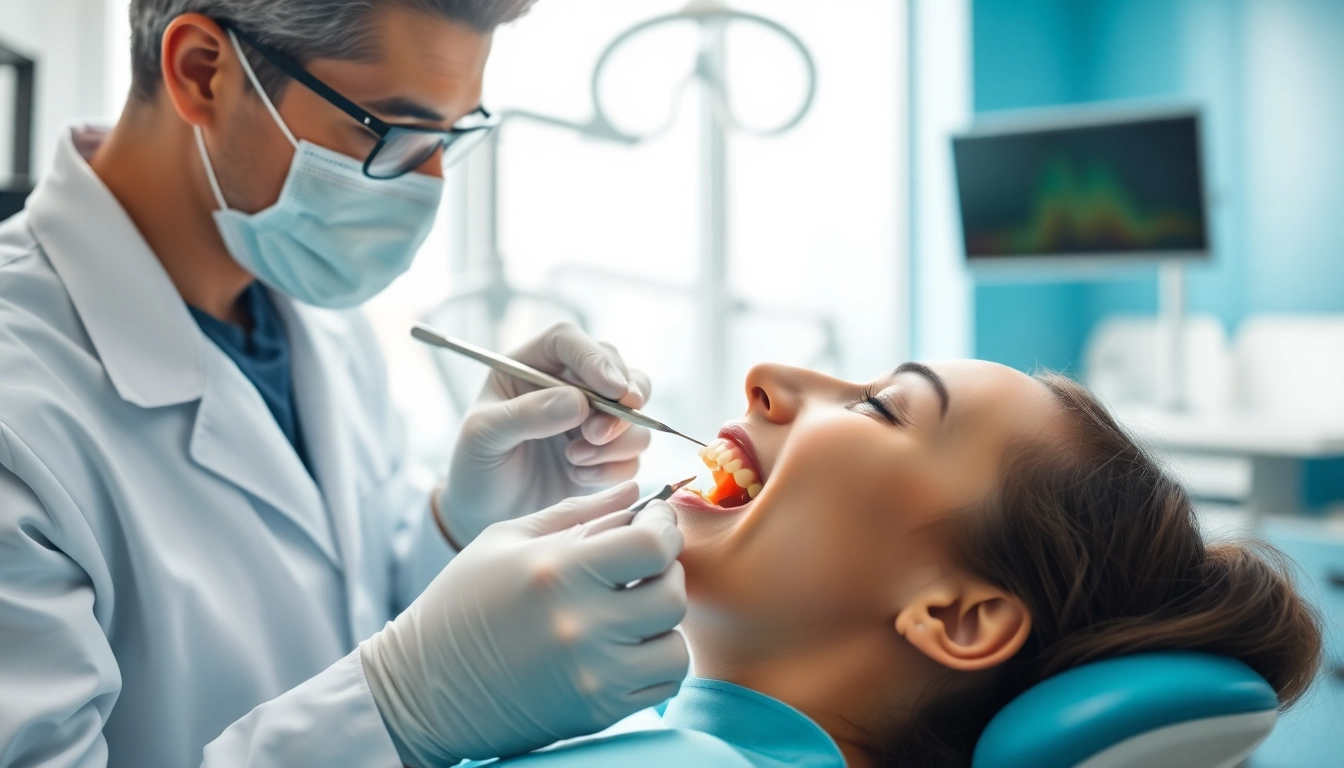Importance of Regular Checkups for Optimal Dental Health

1. Understanding Checkups: A Key to Dental Health
Dental health is often an overlooked aspect of overall well-being. However, regular checkups play a crucial role in maintaining it. These visits are not just a routine task; they serve as a preventative measure against serious dental issues. In this section, we will explore what dental checkups entail, the benefits they offer, and the common procedures performed during these appointments.
1.1 What Are Dental Checkups?
Dental checkups are scheduled appointments with a dentist where they examine your mouth, teeth, and gums. These visits typically occur every six months, although the frequency may vary depending on individual needs. During a checkup, a dentist or dental hygienist will inspect your oral health, checking for cavities, gum disease, and other oral health concerns.
1.2 Benefits of Regular Checkups
Regular dental checkups come with an array of benefits:
- Prevention of Serious Issues: Early detection of problems such as cavities or gum disease can save time and money.
- Professional Cleaning: Dental hygienists perform thorough cleanings that remove plaque and tartar buildup, reducing the risk of dental decay.
- Education on Oral Hygiene: Dentists offer personalized advice on maintaining good oral hygiene and can recommend products for improved care.
- Overall Health Monitoring: Oral health is linked to overall health conditions like diabetes or heart disease. Regular checkups allow for timely discussions on these connections.
1.3 Common Procedures During Checkups
During a typical dental checkup, you can expect the following procedures:
- Visual Examination: The dentist examines your teeth and gums for any signs of decay or disease.
- X-Rays: If necessary, X-rays are taken to check for problems not visible during a visual exam.
- Cleaning: A hygienist will use special tools to clean your teeth, removing plaque and tartar buildup.
- Fluoride Treatment: Fluoride may be applied to help strengthen teeth and prevent decay.
- Discussion of Findings: The dentist will discuss any issues found and suggest next steps or treatment options.
2. How Often Should You Schedule Checkups?
The frequency of dental checkups varies among individuals and can be influenced by several factors such as age, health status, and dental history. Understanding the recommended frequency helps to maintain optimal dental health and prevent issues from escalating.
2.1 Recommended Frequency for Adults
For most adults, the American Dental Association recommends scheduling dental checkups every six months. However, some individuals may require more frequent visits, particularly if they exhibit risk factors like a history of gum disease or smoking. Regular visits aid in maintaining oral hygiene, reducing the risk of cavities and gum disease.
2.2 Children’s Dental Checkup Schedule
Children need regular dental care to ensure their teeth and gums develop correctly. The general recommendation is for kids to have their first dental visit when their first tooth erupts or by their first birthday. After that, checkups should occur every six months. Dentists can track the development of adult teeth and provide preventative care to help protect future dental health.
2.3 Factors Influencing Checkup Frequency
Several factors influence how often an individual should schedule their dental checkups, including:
- Age: Aging adults may require more frequent checkups due to an increased risk of dental problems.
- Health Conditions: Certain health conditions can affect oral health and necessitate more visits.
- Oral Hygiene Practices: Those with poor dental hygiene habits may develop issues that require more frequent monitoring.
- Previous Dental Problems: A history of dental issues may require a follow-up schedule to ensure problems do not recur.
3. Preparing for Your Dental Checkup
Preparation for your dental checkup can enhance the efficiency of your visit and ensure that you get the most out of your appointment. Here are some steps to take to prepare effectively.
3.1 What to Expect During Your Visit
Knowing what to expect during your dental checkup can alleviate anxiety and make your visit more productive. Generally, a visit will follow these steps:
- Check-In: Upon arrival, you will check in with reception and fill out or update any necessary paperwork.
- Preliminary Assessment: A dental hygienist may conduct preliminary assessments, such as recording your medical history.
- Cleaning: The hygienist will perform a cleaning, removing plaque and tartar followed by polishing your teeth.
- Dental Examination: The dentist will then examine your teeth, gums, and mouth for any issues.
- Consultation: After the examination, the dentist will provide you with feedback and treatment recommendations.
3.2 Questions to Ask Your Dentist
During your dental checkup, it’s important to communicate any concerns or questions you have. Here are a few questions to consider asking:
- What is the current state of my dental health?
- Are there any treatments you recommend for specific issues?
- How can I improve my oral hygiene practices at home?
- What is the best toothpaste or mouthwash for my needs?
- How can I prevent dental problems in the future?
3.3 Importance of Dental History
Your dental history plays a significant role in understanding your current dental health. Make sure to provide accurate information about:
- Your past dental treatments and any concerns you have experienced.
- All medications you currently take and any medical conditions you have.
- Your oral hygiene habits at home.
Having this information ready can help your dentist provide better, more tailored advice for your oral care.
4. Overcoming Dental Anxiety for Successful Checkups
Many individuals experience anxiety related to dental visits, which can hinder them from getting the necessary care. Understanding the factors behind dental anxiety and employing various techniques to overcome it can make checkups much more manageable.
4.1 Understanding Dental Anxiety
Dental anxiety can stem from various sources, including fear of pain, feelings of lack of control, and past traumatic experiences. Recognizing these triggers is the first step in managing anxiety effectively.
4.2 Techniques to Manage Anxiety
Several strategies can help individuals cope with dental anxiety, including:
- Practice Deep Breathing: Deep breathing exercises can calm nerves before and during a visit.
- Bring a Support Person: Having a friend or family member accompany you can provide emotional support.
- Communicate with Your Dentist: Share your fears with your dentist; they can adjust their approach to help you feel more comfortable.
- Visualization Techniques: Focusing on positive imagery can distract your mind from anxiety during the visit.
4.3 How Dentists Create a Comforting Environment
Many dental practices are aware of patient anxiety and actively work to create a soothing environment. Here are some features you might encounter:
- Comfortable Waiting Areas: Many practices offer cozy seating, calming decor, and reading materials to help distract patients.
- Friendly Staff: A welcoming approach from the dental team can help patients feel at ease.
- Music or Headphones: Listening to music during procedures can provide a relaxing experience for patients.
5. The Role of Checkups in Preventive Care
Preventive care is essential to maintaining long-term dental health, and regular checkups are a key component of this approach. They help in early identification and management of potential issues, leading to better outcomes over time.
5.1 Identifying Issues Early with Regular Checkups
Regular checkups provide an opportunity for dentists to identify early signs of dental issues, such as cavities, gum disease, or oral cancer. This early identification allows for less invasive treatments, lower costs, and successful outcomes.
5.2 The Importance of Professional Cleanings
While regular brushing and flossing contribute significantly to oral hygiene, professional cleanings are essential for removing hardened plaque and tartar that at-home care may miss. By ensuring that your teeth are professionally cleaned at regular intervals, you maintain a healthy mouth and reduce the risk of periodontal disease.
5.3 Long-term Benefits of Consistent Checkups
Adhering to a consistent schedule of dental checkups has numerous long-term benefits:
- Savings: Preventive care is often less expensive than treating dental issues.
- Better Oral Health: Regular checkups contribute to overall better oral health and hygiene, leading to fewer problems down the line.
- Improved Quality of Life: Maintaining oral health can enhance self-confidence, as well as contribute to social interactions that involve eating and speaking.
- Link to Overall Health: As emerging research reveals, poor oral health is linked to various systemic conditions, emphasizing the need for preventative care.



Leave a Comment